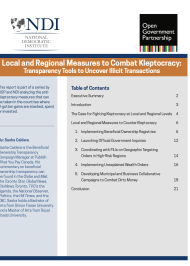
Kleptocracy, which means “rule by thieves,” describes an especially pernicious, predatory type of corruption whereby the institutions of the state are deformed to serve regime elites to steal as much as they can from their own citizens.
Kleptocracies not only undermine good governance in the “source countries” from where the resources are stolen, but they also weaken democratic norms and economic development in the “host countries” in which kleptocrats prefer to stash their cash, resources and families – especially countries with reputations for strong rule-of-law institutions. The harm caused to host countries is multifaceted, and includes political interference, money laundering, warping of investment and real estate markets, and public safety risks such as drug and weapons trafficking, and the proliferation of organized crime.
The National Democratic Institute and Open Government Partnership (OGP) have produced two reports which analyze the anti-kleptocracy measures that can be taken in the host countries where ill-gotten gains are stashed, spent or invested. OGP member countries, and local and regional governments in host countries, can use these reports to develop action plan commitments which address and deter transnational kleptocratic activities that serve to erode democratic governance.
-
Committing to Combat Kleptocracy: A Guide for OGP Members: This report, written by Jodi Vittori, defines how kleptocratic wealth can undermine democratic governance in host countries. It then provides actionable policy recommendations for OGP commitments that host countries can consider to mitigate the harms these kleptocracies can do to their governance, economies and national security.
- Local and Regional Measures to Combat Kleptocracy: This report by Sasha Caldera highlights several interventions which local and regional governments can consider to combat transnational kleptocracy with a specific focus on illicit financial transactions.




